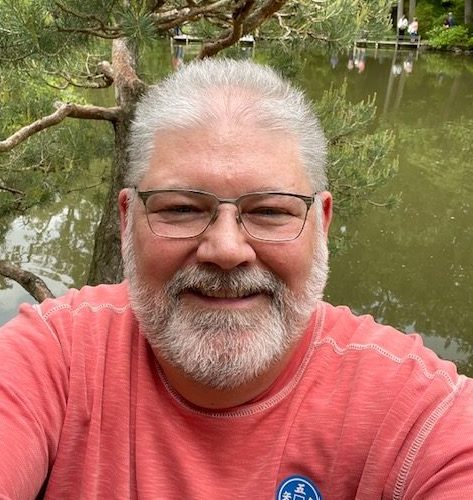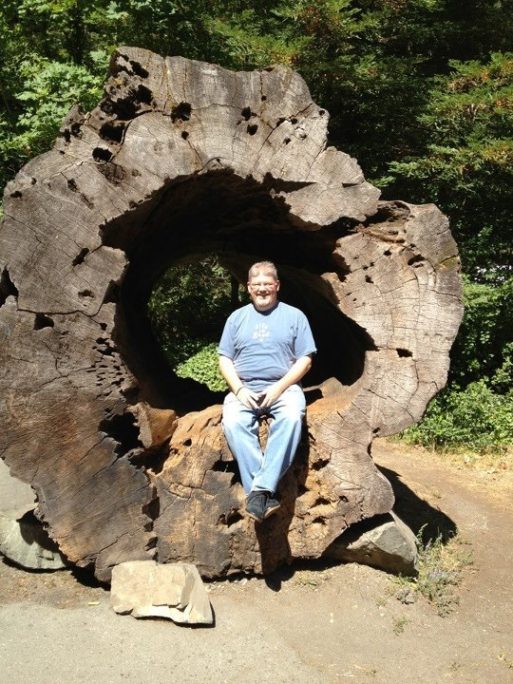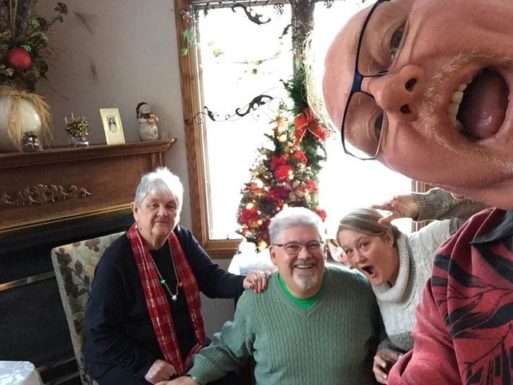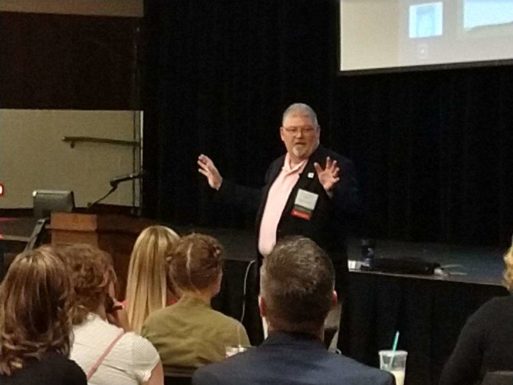
Andrew Vitale teaches others about mindfulness at Anderson Japanese Gardens in Rockford, IL
Andrew J. Vitale, C.T. has been a grief specialist for more than three decades. As a certified thanatologist, Vitale studies the science of death, dying and bereavement including medical, physical, psychological and spiritual perspectives. This professional focus includes the psychological and social mechanisms regarding personal views and reactions to our own mortality, as well as that of others.
Vitale is a mindfulness and meditation practitioner, teaching skills to others to empower them to better cope with their grief. In his current role with Northern Illinois Hospice, Vitale provides bereavement and spiritual support for patients and families. He is also co-author of a wide range of valuable resources on grief, loss, and trauma – “Spiritual Growth and Healing,” “Children: Surviving Traumatic Death,” and “Promoting Resilience: Responding to Adversity, Vulnerability and Loss.”
Vitale is also a steering member of annual The International Death, Grief & Bereavement Conference. The conference hosts intimate and transformative educational experiences for healthcare professionals, funeral service directors, educators, and the public. Vitale first attended this conference while attending a Clinical Pastoral Education Practicum in Atlanta, Georgia, in his early twenties. He will be a featured keynote speaker for their upcoming conference in La Crosse, Wisconsin, in June 2022.
Vitale shares insights on loss and offers ideas on mindfulness and grief to make your way through the difficult times or help others to do so, particularly during the holiday season.
Editor’s note: This interview has been edited for length and clarity.
How is grief such a deeply individual experience for each of us?

Grief is as unique as a snowflake
No two people ever grieve the same way. My favorite quote by my mentor, Dr. Earl A. Grollman of Boston, Massachusetts, sums up this sentiment quite well: “Each person’s grief journey is unique as a fingerprint or snowflake.”
The issue with grief is that the world expects you to get over it. You get only three days of bereavement leave from your job. People assume you move on after that.
We must understand that grief is not a linear process. Life and death are messy. Accept imperfections of life. Many emotions may attack us at once – anger, guilt, resentment, relief. It can feel raw and very real from moment to moment. As time passes, those moments can become less painful and may not last as long as they once did. But there is no way around grief, only through it. And getting through it takes time that is relevant to only ourselves.
How can mindfulness help us to better cope with our grief?

Vitale sits inside a hollowed tree along “The Avenue of the Giants” in Humboldt County, California
Being present, or mindful, is a very powerful thing. It helps when people who are grieving can become more mindful of their negative thoughts surrounding it. Humans are wired that way. Our brain works 24/7, and it tends to spin our thoughts in a negative direction. Mindfulness can distract us from that.
There are many things that people can do to practice mindfulness. The idea is to engage with your surroundings. Submerse yourself in the present moment. These practices can direct your attention away from negative thoughts. Everyone can find one or a few exercises that work well for them and their grief.
Take a walk around the block or simply spend some time outside in the yard. If you can, do it barefoot. Five minutes outside in the sunlight or moonlight can do a lot to make you feel better. The life that surrounds us is part of who we are. When we are present with our surroundings, we start to relax.
Mindfulness can also help us to reign our emotional state. If you can name it, you can tame it. Begin a relationship with each of the emotions that crop up and work on those individually. If we can learn to ground ourselves in the now moment, the present moment, we can stop the momentum of the “would of, could of, should of” kind of moments that often take us down a rabbit hole of remorse or regret. Just remember to be gentle with yourself.
Journaling is another way to practice mindfulness. It is not about keeping a diary but assessing our state of mind at any moment. What woke me up? Why can’t I sleep? What is going on inside my mind? Throw it up. Write it down. Then, let it go for a while.
Why is the holiday season a particularly overwhelming time for those who are grieving the loss of a loved one?
Triggers are very real for those who are grieving. During the holiday season, we can make our grief feel especially worse than it may be. We worry for weeks or months about the gravity of loss we might feel on Thanksgiving Day, or Christmas Eve, or New Year’s Day. In essence, our worries can be worse than how we feel when that day finally arrives.
Sometimes we receive cards from those unaware of our loss. That can easily trigger our emotions. Perhaps you could write a note about their passing to share with them, as well as others who live far away. Highlighting the past year of our lives in a letter is something people often do and include with their Christmas cards. In this instance, it can also be a good opportunity for those grieving to reflect on some good things that may have also happened during that time. This exercise can help us to create a grateful mind for the things we cherish — the stories, memories, family, and friends. Gratitude can be an important part of healing.
How can we celebrate the holidays with others while we are still grieving?

Vitale celebrates the holidays with his family
In the current climate of employee shortages, cargo liners are sitting on the docks full of holiday gifts that may never get delivered to their destinations. Are the holidays about all that stuff? No. It is just another reminder to focus on what really matters. The holidays are about our relationships. The kindness we feel toward others falls into that category. Kindness is a simple reminder that the holidays are not always about us, even when we are grieving. Sometimes our concern for the well-being of others can help us to feel better too.
Ultimately, celebrate how you want to celebrate, especially if this is the first year without your loved one. If you always send out Christmas cards, but it doesn’t feel good to do so this year, don’t do it. Don’t put up a tree if you don’t want to do so. Maybe you usually gather with a lot of people at this time of year. But perhaps, this year you might choose to spend a more intimate holiday with a select few.

Or you may feel inclined to memorialize your loved one on purpose. One year, we lost two very primary people in our family. We set their places at the table anyway. We lit candles and placed memory boxes at each of their settings where guests could place written memories about them. When all the guests left, our family read them together. Those brought both tears and smiles to us.
The Covid-19 pandemic affected our ability to grieve with others and may yet delay our ability to gather with family during this upcoming holiday season. How can those who are mourning still connect with others for support?
This is true. Maybe we were not able to be with our loved one when they passed. Maybe we did not get an opportunity to say goodbye, to bury a loved one, to perform certain rituals, or to mourn with others. These factors can certainly disrupt our entire grieving process and our ability to lean upon friends or family at this time.
With the growth of video platforms like Zoom, we could plan alternative ways to connect with them. Share a virtual dinner or dessert together. Or maybe plan some time to trim your trees together over the internet. For those who are not tech-savvy, we can still find ways to support them in person safely. Showcase the children in their holiday best through a window. Sing Christmas carols in the doorway. Organize a family holiday parade.
That leads me to my next question. It can be challenging for others to know how to best support someone who is grieving during the holidays. Any advice on how to do so without triggering a deeper sadness for them?
It’s still okay to say, “I hope your holidays are happy.” But know that may not be achievable for that person at that time. So many of our friends and family are afraid to say the name of the person who passed. We think it might upset the person who is grieving. It may actually bring comfort for that person to know you did not forget them. It is also an opportunity to inquire with that person whether they prefer company or prefer solitude.
Those who are grieving can get caught up in the holiday storyline and forget about themselves. We can think outside the box and give them what might help them to work through their grief. Things like candles, self-help books, bath bombs, or simple items that encourage self-care are thoughtful holiday gift ideas.
Ultimately, people need to feel their grief. Go through it. They just might need someone to hold their hand. You can simply allow them to feel that pain, as much as it hurts to witness it. It’s the only way they can make their way through it.

Vitale speaks at The International Death, Grief and Bereavement Conference
Any final advice to further assist someone through their grieving journey?
Yes. Giving back can be a very important part of grieving at some point in time. The human spirit wants and needs to give to others. And we can do this in memory or in honor of our lost loved ones by donating to charities or volunteering our time in some way.
When we step outside ourselves like this, grieving can lead us to better lives, even if we don’t know it yet. We might be inspired to encourage other grieving souls someday. What better person than someone who has gone through grief to care for others during their process. Perhaps mindfulness can be something you can share with someone else one day. You don’t need a professional to do that. You just need to be human and care.
I’d like to close with my second favorite quote from my mentor, Dr. Grollman: “Grief is not a disorder, a disease or sign of weakness. It is an emotional, physical, and spiritual necessity, the price you pay for love. The only cure for grief is to grieve.”

 Mindfulness Can Help Us Through Holiday Grief
Mindfulness Can Help Us Through Holiday Grief


 “Songbird” by Fleetwood Mac
“Songbird” by Fleetwood Mac
 First the Wealth Gap, Now the U.S. Has a Growing Health Gap
First the Wealth Gap, Now the U.S. Has a Growing Health Gap















